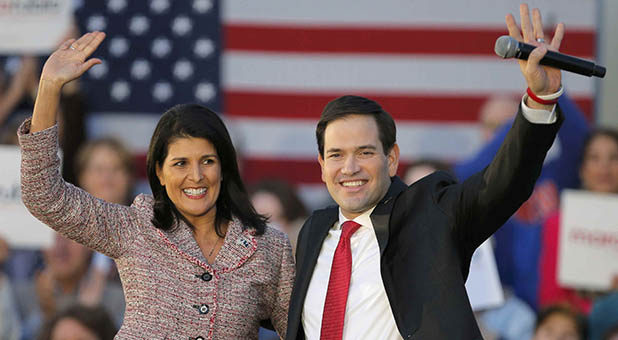Here’s What Marco Rubio Had to Say About the Breakdown in Civility
Wednesday, presidential candidate U.S. Sen. Marco Rubio (R-Fla.) was asked about the acrimony in the current campaign, and the overall collapse of civility in American politics in general.
Nationally syndicated radio host Hugh Hewitt then asked the Florida senator what he would do, as president, to repair the damage that has been done. Rubio said it would start with the way he personally conducts himself.
“Politics is a difficult business, and there are differences between the candidates, and we need to talk about them,” he said. “And if someone is misleading on my record, or on some other issue of import, it’s important to call them out for it.”
What he will “never do as president,” he added, was engage in tactics meant to pit groups of Americans against each other. He said President Obama has engaged in this tactic as means of advancing his political career and agenda.
“I’ll never … try to tell a group of Americans that they need to be angry at another group of Americans, because I’m trying to win an election, so I’m trying to get people angry at each other so they’ll come out and vote,” he said. “That, I won’t do. I won’t be divisive the way this president has deliberately been divisive for political gain.”
During the interview, Hewitt and Rubio also discussed the process to replace the late Antonin Scalia on the Supreme Court. In the previous hour, Sen. Orrin Hatch (R-Utah) told Hewitt he agreed there should be no confirmation hearings and no votes on any Obama nominees until after the November election.
“I think we should just make a very clear decision, and that is that we’re not going to appoint, we are not going to confirm in the Senate until after the election. Anyone,” Rubio said. “We’re just not going to do it until the new president has a chance to weigh in on it. This is a lifetime appointment.”
Rubio pointed out there are typically two ways to leave the high court: resignation or passing away. He said believed a lifetime appointment shouldn’t be made by a “lame duck” president.
“This is going to be an issue that’s debated in the campaign. What kind of justice should replace Justice Scalia after his tragic passing?” he said. “And you know, after that, voters are going to weigh in, and then the new president will be able to decide what kind of justice needs to be appointed, and then the Senate can do their job.”
Rubio also pointed out the nine-member court isn’t a constitutional requirement. Congress has the authority to determine the size of the court.
“They can function with eight justices, and the term will end here in the summer, and then hopefully by the time there’s a new term next year, there will be a new and very different president, and we’ll be able to appoint somebody more like Scalia than what Obama’s going to try and put in place,” he said.
Earlier in the interview, Hewitt noted that Rubio was about to officially receive the endorsement of South Carolina Gov. Nikki Haley. He asked the Florida senator for his thoughts on how it will help boost his campaign.
“Governor Haley and I have been friends for a few years,” he said. “We’re enthused about her support. She is everything, I believe, the conservative movement needs to be about—upward mobility, having parents that leave you better off than yourself, a country where everyone can move up without tearing anyone down … She’s an incredible leader, well-respected both in South Carolina and nationally. And we’re just so excited about her support and what that means to us here down the stretch.”




























































